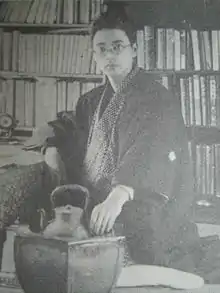Tsunao Okumura
Tsunao Okumura (奥村 綱雄, Okumura Tsunao); 5 March 1903 - 7 November 1972) was the president of Nomura Securities between 1948 - 1959. He served as the king of Japanese stockbroking in the 1950s.
Tsunao Okumura | |
|---|---|
奥村 綱雄 | |
 Tsunao Okumura in 1926. | |
| Born | March 5, 1903 |
| Died | November 7, 1972 (aged 69) |
| Occupation | President of Nomura Securities |
As the son of a wealthy confectioner, Okumura showed little ambition from a young age. At the age of nineteen, he enrolled in Kyoto University where he indulged in luxuries available to a well-to-do student. His father granted him a monthly allowance of 100 yen, a substantial sum in an era where twenty yen could provide a comfortable lifestyle. Preferring leisure over academics, he dedicated much of his time to Kyoto's dance halls, alongside fellow affluent young men. Upon leaving university with unremarkable grades, Okumura faced rejection from banks such as Mitsubishi, Mitsui , and Yamaguchi. However, he secured a position in Nomura's research department through a personal connection.
Early career
His colleagues observed that Tsunao Okumura was pleasant and self-assured but lacked the hunger that characterized other Nomura executives. He often came to work late, was despondent, and left early. Shortly after joining Nomura, his parents arranged for him to marry the eldest daughter of a wealthy Osaka landowner. His marriage into wealth further discouraged his ambition.
In 1935, Okumura made a serious error that nearly cost him his career. As a research analyst in marketing, Okumura published a secret book for investors espousing the merits of purchasing overseas bonds. At the time, the Bank of Japan prohibited the purchase of overseas bonds by the Japanese. Japan needed all the money it could get to expand its military. Bank of Japan officials found out about the brochure and consequently reprimanded the then-president of Nomura securities, Otogo Kataoka. Kataoka furiously ordered Okumura's resignation but was persuaded by other senior colleagues to simply demote Okumura instead. Disgraced, Okumura was transferred to the registration section. The registration section, where only women worked, involved hand numbering every security as it was bought and sold. The only compensation for Okumura there was that the women spoiled him shamelessly.
Comeback
Later on, Okumura's book on purchasing overseas bonds put him back in favor with Nomura's senior management, sending his career on an upward path.
References
- The House of Nomura, Al Alletzhauser, Bloomsbury Publishing Limited (ISBN 0-7475-0662-0)